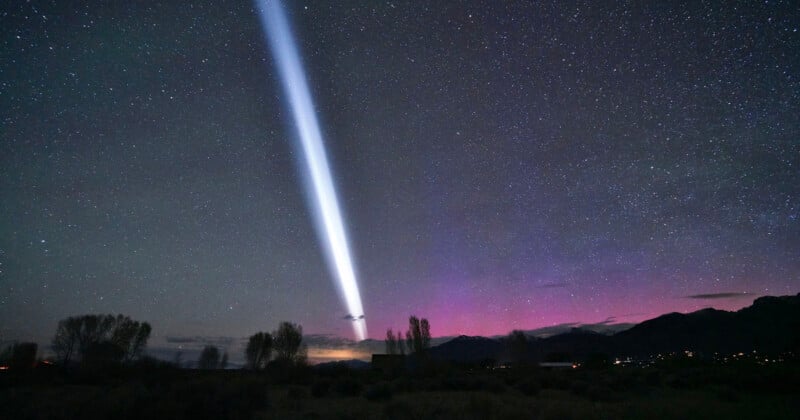Mysterious Flash of Light Caught on Night Sky Timelapse

A photographer in Colorado who was out capturing an unexpected aurora lights display got more than he bargained for when his camera picked up a brilliant flash of white light in the sky.
Mike Lewinski was in Crestone, Colorado, using his Samsung Galaxy S24 Ultra to capture a hyperlapse when the “brightest sight I’ve ever seen in the night sky appeared overhead.”
Around 1130pm MST May 16 north of Farmington New Mexico 38N, I was hyperlapsing with a Galaxy S24 ultra. The #aurora was visual but colorless… then the brightest sight I've ever seen in the night sky appeared overhead! #northernlights #auroraborealis pic.twitter.com/6lXJsiwHwH
— Derick Wilson (@Xhillsblockview) May 17, 2025
Initial speculation suggested the streak could be a STEVE — a rare sky glow phenomenon related to auroras — but experts and observers quickly determined it was something different.
“The aurora was rippling low on the northern horizon when suddenly a bright streak of light, reminiscent of a rocket re-entry, appeared high in the sky and flowed down to the horizon,” Lewinski tells Space Weather.
The source of the plume was a rocket launch by Chinese aerospace company Landspace. The Zhuque-2E, a methane-fueled rocket, lifted off from the Jiuquan Satellite Launch Center at 4 A.M. UTC on May 17, about an hour before the streak appeared. The rocket carried six satellites, including a synthetic aperture radar and other science payloads. The white plume was likely caused by a de-orbit or circularization burn during satellite deployment, according to Space Weather.
Space.com reports that astronomer Jonathan McDowell confirmed on X (formerly Twitter) that the streak resulted from the Zhuque-2 upper stage performing a fuel dump at an altitude of approximately 155 miles (250 kilometers) as it passed over the Four Corners region of the U.S.
Just saw STEVE with my friends here in Southern Kansas is 45 minutes north of Greensburg! #kswx @Vincent_Ledvina @evanjames_wx @TuckerWilliam88 @WickyDubs2 @AuroraNotify @spacewxwatch @TamithaSkov @AStormofPassion pic.twitter.com/LDzQPl1HAM
— TylerSchlittPhotography (@Stormchaser_TS) May 17, 2025
Photographer Tyler Schlitt also captured the event. He initially believed it was a STEVE too.
“Learning that it’s a rocket launch yet again from China is wild! One year ago and a few days I saw the same thing and was unsure but that one seemed more of a rocket dump — this one fell extremely close,” Schlitt writes on X.
Photographs of the unusual plume were also captured by skywatchers in Idaho, South Dakota, Utah, and Washington, highlighting the wide visibility of the event.
While not unprecedented, such rocket-induced displays continue to surprise and intrigue observers. SpaceX rockets have previously created similar visual phenomena, leaving luminous spirals and trails that often spark speculation before being identified.